六年级英语上册复习资料
人教版新版小学六年级英语上册全册学习资料
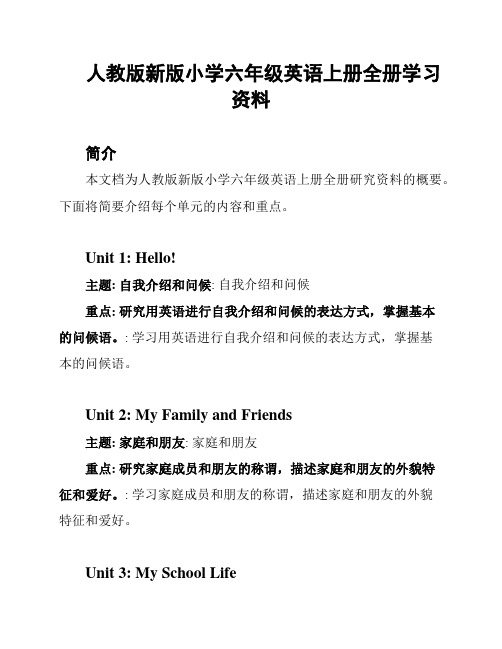
人教版新版小学六年级英语上册全册学习资料简介本文档为人教版新版小学六年级英语上册全册研究资料的概要。
下面将简要介绍每个单元的内容和重点。
Unit 1: Hello!主题: 自我介绍和问候: 自我介绍和问候重点: 研究用英语进行自我介绍和问候的表达方式,掌握基本的问候语。
: 学习用英语进行自我介绍和问候的表达方式,掌握基本的问候语。
Unit 2: My Family and Friends主题: 家庭和朋友: 家庭和朋友重点: 研究家庭成员和朋友的称谓,描述家庭和朋友的外貌特征和爱好。
: 学习家庭成员和朋友的称谓,描述家庭和朋友的外貌特征和爱好。
Unit 3: My School Life主题: 我的校园生活: 我的校园生活重点: 研究描述学校、教室、课程和活动的词汇,了解在校生活中的常见场景。
: 学习描述学校、教室、课程和活动的词汇,了解在校生活中的常见场景。
Unit 4: Leisure Time主题: 休闲时间: 休闲时间重点: 研究谈论休闲活动和爱好,了解并运用动词的ing形式。
: 学习谈论休闲活动和爱好,了解并运用动词的ing形式。
Unit 5: Let's Celebrate!主题: 节日庆祝: 节日庆祝重点: 研究讨论各种节日和庆祝活动,掌握相应的表达方式和词汇。
: 学习讨论各种节日和庆祝活动,掌握相应的表达方式和词汇。
Unit 6: Nature and Environment主题: 自然和环境: 自然和环境重点: 研究描述动物、植物和环境的词汇,了解一些自然保护的知识。
: 学习描述动物、植物和环境的词汇,了解一些自然保护的知识。
总结本册教材包含了六个单元的研究内容,涵盖了日常生活中常见的话题。
通过研究这些内容,学生将能够掌握基本的英语交流能力,并丰富自己的词汇量。
希望本册教材能对学生的英语研究有所帮助。
以上是《人教版新版小学六年级英语上册全册学习资料》的简要介绍。
如需详细内容,请参阅教材。
六年级上册英语复习资料
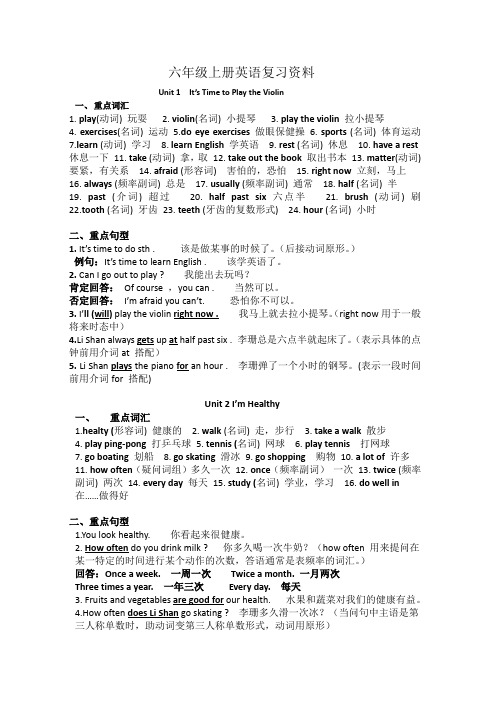
六年级上册英语复习资料Unit 1 It’s Time to Play the Violin一、重点词汇1.play(动词) 玩耍2. violin(名词)小提琴3. play the violin拉小提琴4. exercises(名词) 运动5.do eye exercises 做眼保健操6. sports (名词) 体育运动7.learn (动词) 学习8.learn English学英语9. rest (名词) 休息10. have a rest休息一下11. take (动词) 拿,取12. take out the book取出书本13. matter(动词)要紧,有关系14. afraid (形容词) 害怕的,恐怕15. right now 立刻,马上16. always (频率副词) 总是17. usually (频率副词) 通常18. half (名词) 半19. past (介词) 超过20. half past six六点半21. brush (动词) 刷22.tooth (名词) 牙齿23.teeth (牙齿的复数形式) 24.hour (名词) 小时二、重点句型1. It’s time to do sth .该是做某事的时候了。
(后接动词原形。
)例句:It’s time to learn English .该学英语了。
2. Can I go out to play ?我能出去玩吗?肯定回答:Of course ,you can . 当然可以。
否定回答:I’m afraid you can’t. 恐怕你不可以。
3. I’ll (will) play the violin right now .我马上就去拉小提琴。
(right now用于一般将来时态中)4.Li Shan always gets up at half past six .李珊总是六点半就起床了。
(表示具体的点钟前用介词at 搭配)5. Li Shan plays the piano for an hour .李珊弹了一个小时的钢琴。
六年级上册英语知识点复习提纲
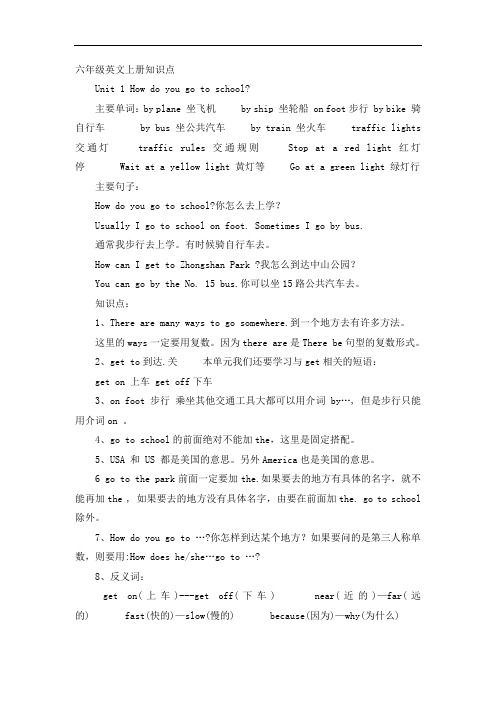
六年级英文上册知识点Unit 1 How do you go to school?主要单词:by plane 坐飞机 by ship 坐轮船 on foot步行 by bike 骑自行车 by bus 坐公共汽车 by train 坐火车 traffic lights 交通灯traffic rules交通规则Stop at a red light 红灯停 Wait at a yellow light 黄灯等 Go at a green light 绿灯行主要句子:How do you go to school?你怎么去上学?Usually I go to school on foot. Sometimes I go by bus.通常我步行去上学。
有时候骑自行车去。
How can I get to Zhongshan Park ?我怎么到达中山公园?You can go by the No. 15 bus.你可以坐15路公共汽车去。
知识点:1、There are many ways to go somewhere.到一个地方去有许多方法。
这里的ways一定要用复数。
因为there are是There be句型的复数形式。
2、get to到达.关本单元我们还要学习与get相关的短语:get on 上车 get off下车3、on foot 步行乘坐其他交通工具大都可以用介词by…, 但是步行只能用介词on 。
4、go to school的前面绝对不能加the,这里是固定搭配。
5、USA 和 US 都是美国的意思。
另外America也是美国的意思。
6 go to the park前面一定要加the.如果要去的地方有具体的名字,就不能再加the , 如果要去的地方没有具体名字,由要在前面加the. go to school 除外。
7、How do you go to …?你怎样到达某个地方?如果要问的是第三人称单数,则要用:How does he/she…go to …?8、反义词:get on(上车)---get off(下车) near(近的)—far(远的) fast(快的)—slow(慢的) because(因为)—why(为什么)same(相同的)—different(不同的)9、近义词:see you---goodbye sure---certainly---of course10、频度副词:always 总是,一直 usually 通常 often经常 sometimes 有时候 never 从来不Unit 2 Where is the science museum?主要单词:library 图书馆 post office 邮局 hospital医院 cinema 电影院 bookstore书店 science museum科学博物馆 turn left向左转 turn right 向右转 go straight 直行 north北 south南 east东 west西主要句子:Where is the cinema, please? 请问电影院在哪里?It’s next to the hospital. 它与医院相邻。
六年级上册英语复资料

六年级上册英语复资料以下是六年级上册英语复习资料,包括一些重点词汇、短语和句子,以及一些常见的语法知识点。
重点词汇:1. subject 科目2. math 数学3. science 科学4. social studies 社会研究5. English 英语6. Chinese 语文7. music 音乐8. art 美术9. physical education 体育10. library 图书馆常见短语:1. have a good day 过得愉快2. see you later 待会儿见3. have a good time 过得开心4. let me know 让我知道5. have a look 看一看6. have a seat 请坐7. what about you 你呢8. I don’t know 我不知道9. I think so 我认为如此10. I’m not sure 我不能确定常见句子:1. What’s your favorite subject? 你最喜欢的科目是什么?2. I like math because it’s fun. 我喜欢数学因为它很有趣。
3. Do you like science? 你喜欢科学吗?4. Yes, I do. 是的,我喜欢。
5. No, I don’t. 不,我不喜欢。
6. What’s your favorite sport? 你最喜欢的运动是什么?7. My favorite sport is basketball. 我最喜欢的运动是篮球。
8. When do you usually get up? 你通常什么时候起床?9. I usually g et up at 7 o’clock. 我通常在7点钟起床。
10. How many hours do you sleep every night? 你每晚睡多少小时?语法知识点:1. 现在进行时:表示正在进行的动作或状态,结构为“be动词+动词ing”。
2023年小学六年级英语上册总复习资料

2023年小学六年级英语上册总复习资料一、听力练
- 学生可以通过听录音来提高听力技能。
- 可以使用英语歌曲和儿童故事CD来训练听力。
- 在听力练中,强化对标准发音和语速的理解。
二、口语练
- 学生可以通过与同学进行英语口语对话来提高口语表达能力。
- 参加英语角活动,积极参与英语对话练。
- 创造外语环境,多与家人和朋友进行英语交流。
三、阅读理解
- 学生可以通过大量阅读英语文章来提高阅读理解能力。
- 多阅读英语故事书、儿童杂志和英语新闻。
- 注意理解关键词,提炼文章主旨。
四、写作训练
- 学生可以通过写作来提升英语写作能力。
- 练写日记、写信、写作文等。
- 注意语法、拼写和表达的准确性。
五、语法规则
- 学生需要掌握基本的英语语法规则。
- 研究动词的时态、主谓一致、名词单复数等。
- 参考英语语法书籍进行研究和巩固。
六、单词记忆
- 学生需要积累和记忆大量的英语单词。
- 利用单词卡片、应用程序等进行记忆。
- 多进行单词拼写和词汇运用的练。
以上是2023年小学六年级英语上册总复习的一些资料和建议,希望对学生们复习英语有所帮助。
祝大家学业进步!。
(精心归纳总结)六年级英语上册重点知识
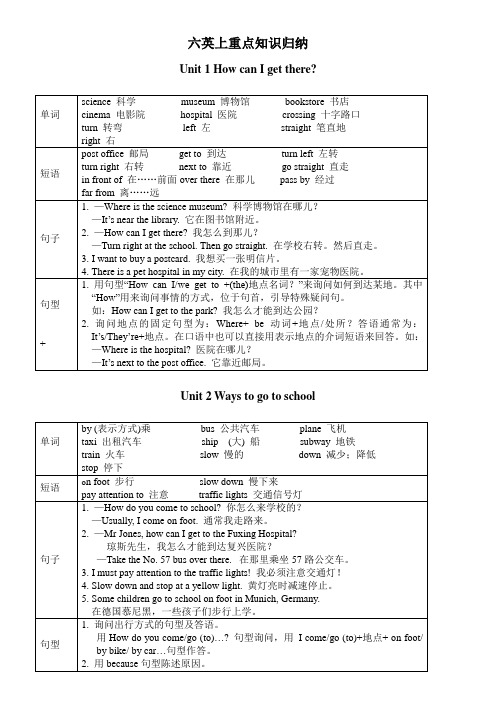
他喜欢猜字谜和远足吗?
—Yes, he does.是的,他喜欢。
句型
1.询问爱好的句型
固定句型:What is/are +one’s+ hobby/hobbies? (……有什么爱好?)
答语:人+like(s) doing…(……喜欢做……)
—She is a nurse.她是一名护士。
2.用句型“Where does+主语(第三人称单数)+work?”询问某人的工作地点。用句型“主语(第三人称单数)+works +(表示地点的)介词短语。”回答。如:
—Where does your father work?你爸爸在哪儿工作?
—He works in a car factory.他在一家汽车工厂工作。
wash clothes洗衣服draw pictures画画
make a snowman堆雪人go for a picnic去野餐
句子
1.—What are you going to do tomorrow?你明天打算做什么?
—I’m going to have an art lesson.我要上美术课。
5. Some children go to school on foot in Munich, Germany.
在德国慕尼黑,一些孩子们步行上学。
句型
1.询问出行方式的句型及答语。
用How do you come/go (to)…?句型询问,用I come/go (to)+地点+ on foot/ by bike/ by car…句型作答。
6年级上册英语重点知识
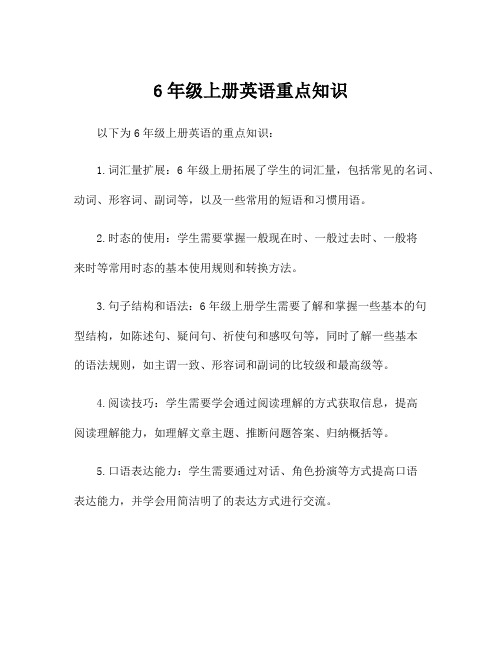
6年级上册英语重点知识
以下为6年级上册英语的重点知识:
1.词汇量扩展:6年级上册拓展了学生的词汇量,包括常见的名词、动词、形容词、副词等,以及一些常用的短语和习惯用语。
2.时态的使用:学生需要掌握一般现在时、一般过去时、一般将
来时等常用时态的基本使用规则和转换方法。
3.句子结构和语法:6年级上册学生需要了解和掌握一些基本的句型结构,如陈述句、疑问句、祈使句和感叹句等,同时了解一些基本
的语法规则,如主谓一致、形容词和副词的比较级和最高级等。
4.阅读技巧:学生需要学会通过阅读理解的方式获取信息,提高
阅读理解能力,如理解文章主题、推断问题答案、归纳概括等。
5.口语表达能力:学生需要通过对话、角色扮演等方式提高口语
表达能力,并学会用简洁明了的表达方式进行交流。
请注意,以上仅是六年级上册英语的一般知识点,具体的重点知识可能因教材和学校的不同而有所差异,请以实际教材和教学要求为准。
六年级英语上册复习资料1

六年级上册复习资料第一单元重点句型:Her hair was short and her eyes were big.P2: 1.two months old两个月大 2.small and cute又小又可爱3.a primary school student一名小学生4.go to junior high school去中学5.tall and pretty 又高又漂亮P3: 1.(be)born出生 2.look around看向四周 3.find his mum找到他的妈妈4.a round head一个圆脑袋5.a long tail一条长尾巴6.no tail没有尾巴7.meet a turtle遇到一只乌龟8.catch flies捉苍蝇P6(写句子):2. In Photo 2, Ben was a primary school student. He was 11 years old.3. In Photo 3, Mrs Li was a junior high school student. She was 14 years old.4. In Photo 4, Mr Li was a pilot. He was 22 years old.P7(作文):1. In this photo, my mother was a baby. She was 2 months old. Her eyes were big.2. In this photo, my father was a junior high school student. He was 14 years old.His hair was short.作文:I was a baby. I was small and cute. My hair was short.Now, I’m a primary school student. I am tall. My hair is long.第二单元重点句型:How was your summer holiday?It was wonderful. We went to the Great Wall.P8: 1.summer holiday暑假 2.visit my grandparents看望我的祖父母3.go to the beach去沙滩4.play ball games玩球类游戏5.go swimming去游泳6.in the sea在海里7.go to Beijing去北京8.visit my uncle拜访我的叔叔9.some famous parks一些有名的公园10.take a lot of photos照许多照片P10:1.visit her uncle拜访她的叔叔 2.go there去那3.the Great Wall长城4.Tian’anmen Square天安门广场P12:作文:5.the Palace Museum故宫博物馆Hi Peter ,6.enjoy her summer holiday享受她的假期I am now in Beijing .7.during the summer holiday在暑假期间I visited my uncle .8.go back to the UK回到英国I went there by plane.9.spend their holiday度过他们的假期I visited the Great Wall.10. Big Ben大本钟11.the British Museum大英博物馆I went to some famous parks .12.have a good time玩的开心13.pick apples摘苹果I took a lot of photos .14.stay with her grandparents和她的祖父母呆在一起How is your holiday ?15.in the countryside在农村Alice第三单元重点句型:What did you have for breakfast this morning?I had some bread and milk.P14:1.have these吃这些 2.not healthy不健康的 3.drink some milk喝一些牛奶4.eat some fruit吃一些水果5. love hamburgers喜爱汉堡包6.have a little meat吃一点肉7. not too much不能太多8.have breakfast/lunch/dinner吃早饭/午饭/晚饭9.very important非常重要P16:1.a lot of fruit and vegetables许多水果和蔬菜 2.eat a lot of rice吃很多大米3.drink a lot of water喝很多水4.a little sweet food少量的甜食5.play sport做运动6.strong and healthy强壮并且健康7.play sport very often经常做运动8.fat and unhealthy胖并且不健康P17:1.eat before bedtime睡前吃东西 2.have poor eating habits拥有不好的饮食习惯3.have some good eating habits拥有好的饮食习惯4.have very good eating habits拥有非常好的饮食习惯5.well do wn做得好第四单元重点句型:Did you play with Sam last weekend? Yes,I did. / No,I didn’t.P24:1.play with…和…一起玩 st weekend上个周末 3.play chess下棋 4.in my home在我家P26:1.a noisy neighbour一个吵闹的邻居 2.live in a tree住在树上 3.live under the tree住在树下4.every night每个晚上5.make a lot of noise制造许多噪音6.very tired非常累7.make noise制造噪音8.stop making noise停止制造噪音9.dig a hole挖个洞10.very quiet underground地下非常安静11.have a good sleep睡得很香12.sleep in holes睡在洞里P29:作文:Peter is my neighbour. He is 12. I often play chess with him.I sometimes play football with him. Last Sunday, we did the homework.We also played together.第五单元重点句型:In the past, there were many pandas.P30:1.in the past在过去 2.one thousand six hundred 1600 3.in the wild在野外4.South China tiger华南虎5.blue whale蓝鲸6.in danger面临危险P32:1.work with…和…一起工作 2. wild animals野生动物 3.on her way home在她回家的路上4.take care of照顾5.go for a walk散步6.see a rhino看见一只犀牛7.drive away赶走8.live together住在一起9.many months许多个月10.grow up长大11.learn a lot学会了很多11.send A back to B把A送回到B 12.three years later三年以后P33:African elephant----African elephants非洲象red fox---red foxes红狐狸wolf---wolves狼第六单元重点句型:Would you like to have e-friend in other countries?P36:1.in different countries在不同的国家 2.in other countries在其他的国家 3.in the UK在英国4.talk about谈论5.our favourite football teams我们最喜欢的足球队6.in Australia在澳大利亚7.our favourite books and films我们最喜欢的书和电影8.in the US在美国P38:1.the E-friend Club网友俱乐部 2.wear glasses戴眼镜 3.favourite subjects最喜欢的科目4.a junior high school student一名中学生5.write back soon立马回信P44作文:Name: Chinese white dolphin Chinese white dolphins lives in the South China Sea.Colour:grey, pink or white They’re grey, pink or white.Food : fish They eat fish.Live in: the South China Sea Now they’re in danger.Number: about 2500 There are only about 2500 in the wild.第七单元重点句型:Shall we go and see a film this weekend? Sure.P46:go and see a film去看电影Snow White白雪公主 a beautiful princess一位漂亮的公主meet seven little friends遇到七个小矮人an interesting film一个有趣的电影Plice Story警察故事an exciting film一个令人激动的电影 a brave policeman一个勇敢的警察catch bad people抓坏人 next time下一次 on Sunday afternoon在星期天下午P48:once upon a time从前 a magic mirror一面魔镜 the fairest of all最美丽的kill Snow White杀死白雪公主 run away逃跑 the next day第二天 fall asleep睡着作文:1.Snow White:It’s about a beautiful princess. She meets seven little friends in the forest.It’s interesting.2.Police Story:It’s about a brave policeman. He catches bad people.It’s exciting.3.The Monkey Key:It’s about a clever monkey. It’s interesting.第八单元重点句型:What did you see at the museum? I saw a lot of interesting cars.P52:1.a toy bee一只玩具蜜蜂 2.an insect museum一个昆虫博物馆 3.at the museum在博物馆3. other insects其他的昆虫 5.some of them他们中的一些 6.a car museum一个汽车博物馆7. a lot of interesting cars许多有趣的小汽车8.so cool很酷9.go there去那P54:1.in the city在城市 2.go to the museum去博物馆 3.on the second floor在第二层4. many kinds of许多种类5.at the piano在钢琴前6.play songs弹奏歌曲7.beside the piano在钢琴旁边8.a robot dancer一个机器人舞者9.move his head and arms移动头和手臂10.many other interesting robots许多其他有趣的机器人11.have a great time玩的开心P56:作文: A visit to a car museum P57: the Louvre Museum----Paris---I visited a car museum on 14th May. ---art museumIt is big.I saw a lot of interesting cars.第九单元重点句型:How long does it take to get to Shanghai from Beijing by train?It takes about five hours.P58:1.the capital of ... ...的首都 2.a great city一座大城市 3.in the east of...在...的东部5. far away from...离...远 5.each other彼此之间 6P60:1.most tourists大多数的游客 2.love eating dumplings喜爱吃饺子3. a lot of tall buildings许多高的建筑物4.a lot of tourists许多游客5.love eating sushi喜爱吃寿司6. find many museums发现许多博物馆7. fish and chips炸鱼薯条Big Ben---a clock tower---make beautiful sounds第十单元重点句型:It keeps them high in the sky.P68:1.no colour or shape没有颜色和形状 2.no smell or taste没有气味和味道 3.all people所有人4. keep us alive保持我们活着 5.keep them high保持他们高高的P70: 1.the black smoke黑烟 2.make the air dirty使空气变脏 3.so fresh如此的清新4.keep the air clean使空气保持洁净5.plant more trees 种植更多的树6.keep our city clean使城市保持洁净第十一单元重点句型:We get wood from tress. We use wood to make pencils.P74: 1.make our city beautiful使我们的城市变美丽 2.get a lot of things from trees从树那里获得许多东西3. get fruit from trees从树上得到水果4.get wood from trees从树上得到木材4. use wood to...使用木材去... 6.cool the air使空气变凉7.plant more trees种植更多的树P76: 1.have to 不得不 2.fly to the south飞向南方 3.next spring下一个春天 e back回来5. cut down砍掉6.fly to the factory飞向工厂7.look for寻找8.make matches制作火柴作文:We get wood from trees.We use wood to make a lot of things.We use wood to make beds / houses / chairs / matches...植树节(Tree Planting Day):中国on 12th March / 澳大利亚on the Sunday in July第十二单元重点句型:We should stop cutting down so many trees.P80:1.stop throwing rubbish into rivers停止把垃圾扔进河里2. stop cutting down so many trees停止砍伐如此多的树3. stop using plastic bags 停止使用塑料袋P82:1.live on the Earth住在地球上 2.a beautiful place一个美丽的地方3.many different plants and animals许多不同的植物和动物4.clean water and air干净的水和空气5.smoke from cars and factories来自汽车和工厂的烟6.make the air dirty使空气变脏7.get sick生病8.work together一起工作9.pick up rubbish捡垃圾10.plant trees植树11.recycle glass and paper回收玻璃和纸12.bring our own shopping bags带我们自己的购物袋P84:1.cut down trees砍树 2.build more factories and houses建更多的工厂和房子4. write on both sides of paper在纸的两面写字 4.kill wild animals杀死野生动物5. walk or ride a bike more often 更多的走路或骑自行车作文:The Earth is sick.The Earth was clean and beautiful in the past.Now some parts are dirty.We should stop throwing rubbish into rivers.We should stop cutting down so many trees.We should stop using plastic bags.We should pick up rubbish.We should plant trees every year.。
pep小学英语六年级上册复习资料

pep小学英语六年级上册复习资料PEP小学英语六年级上册复习资料随着小学六年级上册英语学习的逐渐结束,孩子们即将迎来期末考试。
为了帮助孩子们更好地复习,本文将提供一些PEP小学英语六年级上册的复习资料,希望能对孩子们的学习有所帮助。
一、基础词汇复习在六年级上册的学习中,孩子们已经掌握了一定的英语词汇量。
在复习过程中,可以通过词汇卡片的方式进行记忆。
将单词写在卡片上,一面写英文,一面写中文,然后将卡片翻过来,通过读英文来回忆中文的意思。
可以通过这种方式来巩固词汇。
二、语法知识复习除了词汇外,语法知识也是英语学习中非常重要的一部分。
在复习过程中,可以通过做一些语法练习来加深对语法知识的理解。
例如,练习使用动词的不同时态,练习使用不同的句型结构等等。
通过这些练习,可以帮助孩子们更好地掌握语法知识。
三、听力训练在六年级上册的学习中,听力训练是非常重要的一环。
通过听力训练,可以提高孩子们的听力理解能力,帮助他们更好地理解英语的听力材料。
可以通过听录音并回答问题的方式来进行听力训练。
还可以通过听故事、听对话等方式来提高听力技巧。
四、口语练习口语练习是英语学习中非常关键的一环。
通过口语练习,可以提高孩子们的口语表达能力,培养他们的英语口语思维。
可以通过角色扮演、对话练习等方式来进行口语练习。
还可以通过与同学或老师进行英语对话来提高口语水平。
五、阅读理解阅读理解是英语学习中非常重要的一项技能。
通过阅读理解练习,可以帮助孩子们提高阅读理解能力,培养他们的阅读习惯。
可以通过阅读短文并回答问题的方式来进行阅读理解练习。
还可以通过阅读故事、文章等来提高阅读理解能力。
六、写作训练写作是英语学习中培养孩子们语言表达能力的重要环节。
通过写作训练,可以提高孩子们的写作能力,培养他们的写作思维。
可以通过写日记、写作文等方式来进行写作训练。
还可以通过与同学或老师进行英语写作交流来提高写作水平。
以上是对PEP小学英语六年级上册的复习资料的介绍。
六年级英语-上册复习资料
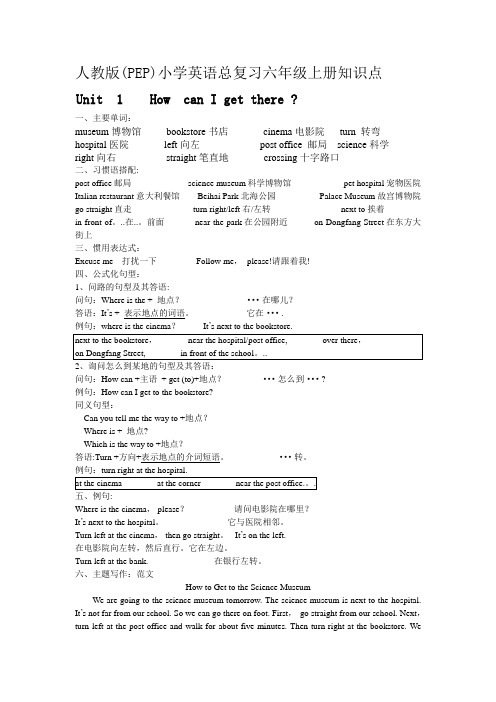
人教版(PEP)小学英语总复习六年级上册知识点Unit 1 How can I get there ?一、主要单词:museum博物馆bookstore书店cinema电影院turn 转弯hospital医院left向左post office 邮局science科学right向右straight笔直地crossing十字路口二、习惯语搭配:post office邮局science museum科学博物馆pet hospital宠物医院Italian restaurant意大利餐馆Beihai Park北海公园Palace Museum故宫博物院go straight直走turn right/left右/左转next to挨着in front of。
..在..。
前面near the park在公园附近on Dongfang Street在东方大街上三、惯用表达式:Excuse me 打扰一下Follow me,please!请跟着我!四、公式化句型:1、问路的句型及其答语:问句:Where is the + 地点?···在哪儿?答语:It’s + 表示地点的词语。
它在···.例句:where is the cinema?It’s next to the bookstore.2、询问怎么到某地的句型及其答语:问句:How can +主语+ get (to)+地点?···怎么到···?例句:How can I get to the bookstore?同义句型:Can you tell me the way to +地点?Where is + 地点?Which is the way to +地点?答语:Turn +方向+表示地点的介词短语。
···转。
例句:turn right at the hospital.五、例句:Where is the cinema, please?请问电影院在哪里?It’s next to the hospital。
六年级英语上册期末复习资料(人教版六年级上英语全册期末复习提纲)

am 只跟I放在一起be动词 is 主语是单数时用are 主语是复数时用Unit 1 询问一些地点在哪;怎样到达一些地点1.询问地点在哪:Where is the 地点Where is the cinema? 电影院在哪?回答: near(附近)next to(旁边)It’s behind(后面) the 地点in front of(前面)It’s near the zoo. 它在动物园附近。
2. 询问怎样到达一个地点:How can I get to the 地点How can I get there/ here ?How can I get to the cinema? 我怎样到达电影院?回答:turn leftturn right at the 地点 go straightTurn right at the zoo. 动物园右转。
Turn left at the zoo, and then go straight, the cinema is on your left.动物园左转然后直走,电影院在你的左边。
或:You can Take the No.57 bus. 你可以乘坐57路公交车。
人 can take the No.数字 busUnit2 到达一些地点的交通方式doesHow do you go to school? 你怎么去学校?回答:人 go(goes) to school by 交通工具I go to school on foot. She goes to school by bus.2.人 must 动词原形人必须……People on bikes must wear one. 骑自行车的人必须戴一个。
I must pay attention to the traffic lights. 我必须注意交通信号灯。
Unit3 人打算做事1.人 be going to do(动词原形) 人打算(或将要)去做事She is going to see a film. 她打算去看电影。
(完整word版)PEP人教版六年级英语上册各单元复习要点
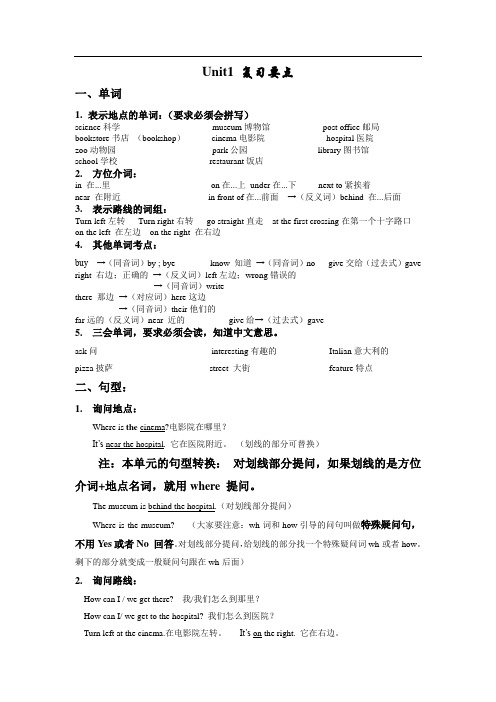
Unit1 复习要点一、单词1.表示地点的单词:(要求必须会拼写)science科学museum博物馆post office邮局bookstore书店(bookshop)cinema电影院hospital医院zoo动物园park公园library图书馆school学校restaurant饭店2.方位介词:in 在...里on在...上under在...下next to紧挨着near 在附近in front of在...前面→(反义词)behind 在...后面3.表示路线的词组:Turn left左转Turn right右转go straight直走at the first crossing在第一个十字路口on the left 在左边on the right 在右边4.其他单词考点:buy →(同音词)by ; bye know 知道→(同音词)no give交给(过去式)gave right 右边;正确的→(反义词)left左边;wrong错误的→(同音词)writethere 那边→(对应词)here这边→(同音词)their他们的far远的(反义词)near 近的give给→(过去式)gave5.三会单词,要求必须会读,知道中文意思。
ask问interesting有趣的Italian意大利的pizza披萨street 大街feature特点二、句型:1.询问地点:Where is the cinema?电影院在哪里?It’s near the hospital. 它在医院附近。
(划线的部分可替换)注:本单元的句型转换:对划线部分提问,如果划线的是方位介词+地点名词,就用where 提问。
The museum is behind the hospital.(对划线部分提问)Where is the museum? (大家要注意:wh-词和how引导的问句叫做特殊疑问句,不用Yes或者No 回答。
六年级英语上册知识点复习汇总
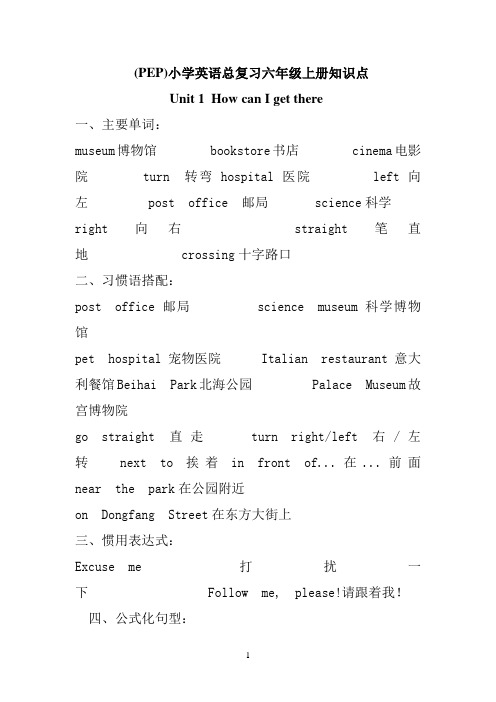
(PEP)小学英语总复习六年级上册知识点Unit 1 How can I get there一、主要单词:museum博物馆bookstore书店cinema电影院turn 转弯hospital医院left向左post office 邮局science科学right向右straight笔直地crossing十字路口二、习惯语搭配:post office邮局science museum科学博物馆pet hospital宠物医院Italian restaurant意大利餐馆Beihai Park北海公园 Palace Museum故宫博物院go straight直走turn right/left右/左转next to挨着in front of...在...前面near the park在公园附近on Dongfang Street在东方大街上三、惯用表达式:Excuse me 打扰一下Follow me, please!请跟着我!四、公式化句型:1、问路的句型及其答语:问句:Where is the + 地点······在哪儿答语:It's + 表示地点的词语(next to the bookstore,near the hospital/post office, over there,on Dongfang Street, infront of the school... )2、询问怎么到某地的句型及其答语:问句:How can +主语+ get (to)+地点·····怎么到·····同义句型:Can you tell me the way to +地点Where is + 地点Which is the way to +地点五、例句:Where is the cinema, please 请问电影院在哪里It's next to the hospital.它与医院相邻。
六年级英语上册重点单词句型语法复习资料
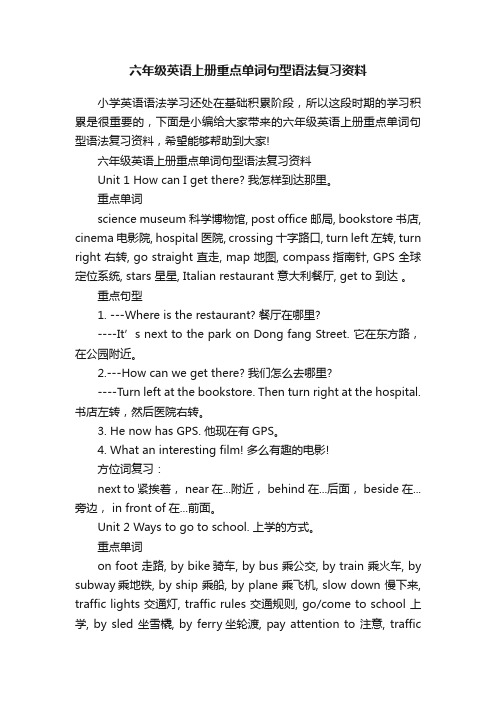
六年级英语上册重点单词句型语法复习资料小学英语语法学习还处在基础积累阶段,所以这段时期的学习积累是很重要的,下面是小编给大家带来的六年级英语上册重点单词句型语法复习资料,希望能够帮助到大家!六年级英语上册重点单词句型语法复习资料Unit 1 How can I get there? 我怎样到达那里。
重点单词science museum 科学博物馆, post office 邮局, bookstore书店, cinema电影院, hospital 医院, crossing 十字路口, turn left 左转, turn right 右转, go straight 直走, map 地图, compass指南针, GPS 全球定位系统, stars 星星, Italian restaurant 意大利餐厅, get to 到达。
重点句型1. ---Where is the restaurant? 餐厅在哪里?----It’s next to t he park on Dong fang Street. 它在东方路,在公园附近。
2.---How can we get there? 我们怎么去哪里?----Turn left at the bookstore. Then turn right at the hospital.书店左转,然后医院右转。
3. He now has GPS. 他现在有GPS。
4. What an interesting film! 多么有趣的电影!方位词复习:next to紧挨着, near在...附近, behind在...后面, beside在...旁边, in front of在...前面。
Unit 2 Ways to go to school. 上学的方式。
重点单词on foot 走路, by bike骑车, by bus 乘公交, by train 乘火车, by subway乘地铁, by ship 乘船, by plane 乘飞机, slow down 慢下来, traffic lights 交通灯, traffic rules 交通规则, go/come to school 上学, by sled 坐雪橇, by ferry坐轮渡, pay attention to 注意, trafficlights交通灯, Stop and wait at a red light 红灯停等一等, slow down and stop at a yellow light 黄灯减速并停下, Go at a green light 绿灯行。
六年级上册英语复习资料
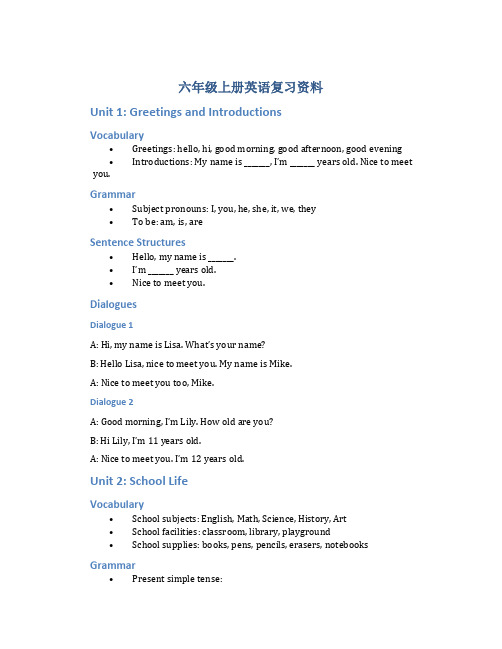
六年级上册英语复习资料Unit 1: Greetings and IntroductionsVocabulary•Greetings: hello, hi, good morning, good afternoon, good evening •Introductions: My name is _______, I’m _______ years old. Nice to meet you.Grammar•Subject pronouns: I, you, he, she, it, we, they•To be: am, is, areSentence Structures•Hello, my name is _______.•I’m _______ years old.•Nice to meet you.DialoguesDialogue 1A: Hi, my name is Lisa. What’s your name?B: Hello Lisa, nice to meet you. My name is Mike.A: Nice to meet you too, Mike.Dialogue 2A: Good morning, I’m Lily. How old are you?B: Hi Lily, I’m 11 years old.A: Nice to meet you. I’m 12 years old.Unit 2: School LifeVocabulary•School subjects: English, Math, Science, History, Art•School facilities: classroom, library, playground•School supplies: books, pens, pencils, erasers, notebooksGrammar•Present simple tense:–Positive: I/You/We/They + verb–Negative: I/You/We/They + don’t + verb–Question: Do + I/You/We/They + verb?Sentence Structures•I like _______.•I don’t like _______.•Do you like _______?DialoguesDialogue 1A: What subjects do you have at school?B: We have English, Math, Science, and History.A: That sounds interesting. Which one is your favorite?B: I like Math the most. What about you?A: I like Science.Dialogue 2A: Do you have any school supplies?B: Yes, I have books, pens, and notebooks.A: Do you like drawing?B: No, I don’t like drawing.Unit 3: Family and FriendsVocabulary•Family members: father, mother, brother, sister, grandparents •Friends: friend, best friend•Adjectives to describe people: kind, funny, smart Grammar•Possessive adjectives: my, your, his, her, our, their Sentence Structures•This is my _______.•He/She is my _______.DialoguesDialogue 1A: Who is the person in the picture?B: This is my mother.A: She looks very kind.B: Yes, she is very kind.Dialogue 2A: Who is your best friend?B: His name is Jack. He is very funny.A: That’s great.Unit 4: Daily ActivitiesVocabulary•Daily routine: wake up, get dressed, eat breakfast, go to school, have lunch, do homework, go to bed•Adverbs of frequency: always, often, sometimes, rarely, never Grammar•Present simple tense:–Positive: He/She/It + verb + s/es–Negative: He/She/It + doesn’t + verb–Question: Does + He/She/It + verb?Sentence Structures•I usually _______.•He/She always _______.•Does she _______?DialoguesDialogue 1A: What time do you usually wake up?B: I usually wake up at 7 o’clock.A: And when do you go to bed?B: I usual ly go to bed at 9 o’clock.Dialogue 2A: Does your brother do his homework every day?B: No, he rarely does his homework.A: Oh, that’s not good.Unit 5: Food and DrinksVocabulary•Food: bread, rice, noodles, chicken, beef, fish, vegetables, fruits •Drinks: water, milk, juice, tea, coffeeGrammar•Countable and uncountable nouns:–Countable: I have two _______.–Uncountable: I have some _______.Sentence Structures•I like eating _______.•I don’t like drinking _______.•Do you like eating _______?DialoguesDialogue 1A: What’s your favorite food?B: My favorite food is pizza.A: That sounds delicious.B: Yes, it’s very tasty.Dialogue 2A: Do you drink milk every day?B: No, I don’t like drinking milk.A: What do you drink then?B: I like drinking juice.ConclusionThis document serves as a review material for the content covered in the first semester of the sixth grade English course. It includes vocabulary, grammar, sentence structures, and dialogues from different units. By studying and practicing these materials, students will be able to reinforce their English language skills and prepare for future lessons.。
- 1、下载文档前请自行甄别文档内容的完整性,平台不提供额外的编辑、内容补充、找答案等附加服务。
- 2、"仅部分预览"的文档,不可在线预览部分如存在完整性等问题,可反馈申请退款(可完整预览的文档不适用该条件!)。
- 3、如文档侵犯您的权益,请联系客服反馈,我们会尽快为您处理(人工客服工作时间:9:00-18:30)。
第一部分听力练习一、选出你听到的单词,并把代号填入题前的括号内(10分) .( ) 1. A.mine B.many C.my D.more ( ) 2. A.banana B.Canada C.cake D.can ( ) 3. A.mess B.miss C.Ms D.Mr ( ) 4. A.map B.stand C.stamp D.sit ( ) 5. A.other B.another C.their D.these ( ) 6. A.woman B.women C.mountain D.meat ( ) 7. A.teddy B.copy C.hobby D.mummy ( ) 8. A.collect B.cat C.cap D.cake ( ) 9. A.ready B.really C.real D.busy ( ) 10.A.sometimes B.some time C.some D.time二、听问句,选答语。
(10分)()1.A.Thanksgiving Day B. That sounds nice.( ) 2. A. No, I don’t. B. Yes, of course.( )3. A. Yes, I can B. No, I haven’t.( )4. A. We eat moon cakes. B. They are famous men and women.( )5. A. We carry flags and we sing songs.B. We have a big family dinner. ( )6. A. It’s about six thousand seven hundred kilometers.B. It’s got eight million people.7. A. I’m sanding an email to my family in China.B. Sometimes.8.A. I want you to be my friend.B. I want to visit China someday.9.A. I like noodles.B. It’s a fantastic present.10. A. Yes, I’d love toB. Yes, of course. I often read stories.三、听音判断与你所听到的句子是否相符.相符的打”√”不相符的打”×”(10分)()1.We eat rice on Spring Festival.( ) 2.We always have a special meal on Thanksgiving Day,( ) 3. I’ve got two friends from America.( ) 4.Daming has got a kite from Japanese.( ) 5.I can speak some English. ( ) 6. She sometimes cleans her room.( ) 7. I want to visit the moon.( )8. There are lots of Chinese shops and restaurants there.( )9. These are some stamps from Canada.( )10. We always have a special meal.第二部分笔试四、英汉互译。
(把汉语标号写在横线上)(15分)Lantern Festival______ send an email_____Chinatown in Canada______Be my pen friend______the T ian’an Men square______clean your room____- Mexico_____restaurant____hobby____chopsticks_____You’re welcome_____not very often_____speak English_____ all around the world______ library card______ 1. 发一封电子邮件 2. 元宵节3. 成为我的笔友4. 在加拿大的唐人街5.不用谢6.天安门广场7.墨西哥8.打扫你的房间9.业余爱好10. 饭馆11.筷子12.不是很经常13.说英语14. 借书卡15.全世界五、选择词填空,并把正确答案写在题中横线上,注意大小写.(15分)A. has got B.have got C.there are D.there is1. There are some beautiful squares in Dalian .2. __________ a book and a pen on her desk .3. They __________ a lovely dog .4. She__________ some photos .5. The desk__________ four legs .read、fly、play、see、walks、skip、visit、climbs 、are 、eating6. He always _____ trees.7. She likes _____ fast food.8、Do you go to the zoo to animals?9、My cousin to school.10、Jenny likes to with her skipping rope.11、They always go to the playground to basketball.12、What colour her eyes?13、On Sunday, my parents and I go to the park toa kite.14、My friend Peter likes to newspapers.15、I never______ visit the moon.六、用所给动词的适当形式填空. (10分)1. __________ ( tell ) me more about the Great Wall .2.China and Japan __________ ( be ) in the east and Mexico__________ ( be )in the south.3. __________ you __________ ( miss ) China ? Sometimes .4 We ______ ( go ) to Chinatown tomorrow .5.They__________( collect ) lots of great stamps last year .6.Girls like_______ ( dance ) and_______ ( play ) football is boys’ hobby .7.Let’s _______ ( go ) to Chinatown now .8. _______(not) ride your bicycle here!9. I want to_____ (show) Daming the present from China.10. Pandas_____( eat) for twelve_____( hour) a day. 11. Daming_____( have) got a _____(China) kite and we fly it in the park.12. ______(Please) to meet you!13. I can____( dancing) and I can play football and I can play_____ ______ (violin).七、单项选择(10分)()1、 a fantastic present!A、HowB、WhereC、WhatD、That()2、I want go to the park.A、doB、inC、withD、to()3、Not really, I a long time ago.A、stopB、stopsC、stopedD、stopped()4、Do you often to school?A、speakingB、walkingC、walkD、reading()5、you want to go inside?A、DoesB、DidC、AreD、Do()6、Lily sometimes the blackboard.A、talksB、walkC、cleansD、reads()7、——Do pandas love bamboo meat?——Of course bamboo.A、andB、or()8、——are you happy?——Christmas is coming.A、Why, BecauseB、What ,For()9、Do you want to read books?A、someB、any ()10、What do you do Spring Festival?A、onB、at八、连词成句(5分)1、building,big,what,a !2、want,you, do, to, inside, go ?3、eat,hours,a,twelve,pandas, day, for .4、has,lunch,noodles,he,for .5、bird,want,to,be,a,you,do ?九、改错(5分)1、There are a picture book in this photo. ( )改为A B C2、Does she often clean she room? ( )改为A B C3、Do they often play at dolls? ( )改为A B C4、Does you want to see my photos? ( )改为A B C5、I love picture books,did you? ( )改为A B C六年级上英语期末考试题(外研版)I. 根据汉语提示将下列句子补充完整。
(15分)1.The moon is ________(百万)of years old.2. I’m ______(放)my new stamps into my album.3.Here is her _________(地址).4.________(高兴的)to meet you.5.Chinese ____________(筷子)are difficult for Amy.6.Pandas love _________(竹子).7.I want to _______(选择)some books.8.It is going to _______(下雨)tomorrow.9.Simon often ________ (帮助)his mum.10.Amy likes ___________ (喝) orange juice.11.I _________ (写)a letter to my mum yesterday.12.An elephant ________(睡)for three hours a night.13.I don’t often ________ (打扫)my room.14.He is ______(演奏)the trumpet, but then his friend _________(来).II. 选择填空。
